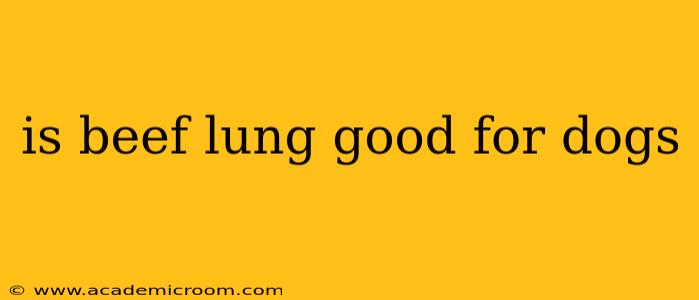Is Beef Lung Good for Dogs? A Comprehensive Guide
Beef lung, often overlooked as a dog treat or supplement, has recently gained popularity among pet owners seeking alternative protein sources. But is it truly beneficial for canine companions? Let's delve into the nutritional value, potential benefits, and drawbacks of feeding beef lung to your dog.
Understanding the Nutritional Profile of Beef Lung
Beef lung is a surprisingly good source of protein, crucial for muscle building and overall health in dogs. It's also relatively low in fat compared to other organ meats, making it a suitable option for dogs prone to weight gain. Furthermore, it contains various vitamins and minerals, including iron, which is vital for oxygen transport in the blood. However, the exact nutritional composition can vary depending on the source and processing methods.
What are the benefits of feeding beef lung to my dog?
Many dog owners report positive experiences when incorporating beef lung into their pet's diet. These benefits often include:
- Enhanced Protein Intake: As mentioned earlier, beef lung is a great source of high-quality protein, supporting muscle growth and repair. This is particularly beneficial for active dogs or those recovering from illness or injury.
- Improved Coat and Skin Health: Some pet owners observe improvements in their dog's coat and skin condition, potentially attributed to the vitamins and minerals present in beef lung.
- Increased Energy Levels: The readily available protein can contribute to increased energy levels, particularly in dogs with lower activity levels due to dietary deficiencies.
- Palatability: Many dogs find beef lung quite palatable, making it a good option for picky eaters or as a reward during training sessions.
Are there any risks or downsides to feeding my dog beef lung?
While generally considered safe, there are some potential risks and considerations to keep in mind:
- Potential for Allergic Reactions: Like any new food, introduce beef lung gradually to monitor for any allergic reactions such as itching, vomiting, or diarrhea.
- Source and Quality: It's crucial to source beef lung from reputable suppliers who adhere to strict quality and safety standards. Improperly processed or sourced lung can harbor harmful bacteria or parasites.
- High in Cholesterol: While lower in fat than some other organ meats, beef lung still contains cholesterol, so moderation is key, especially for dogs with pre-existing health conditions.
- Choking Hazard: Always cut beef lung into appropriately sized pieces for your dog to prevent choking.
How much beef lung should I feed my dog?
The appropriate amount of beef lung depends on your dog's size, age, activity level, and overall dietary needs. Start with small quantities and gradually increase the amount while closely observing your dog's reaction. It's always best to consult with your veterinarian to determine the ideal amount to incorporate into your dog's diet. Beef lung should be considered a supplement, not a primary food source.
Can I feed my dog raw beef lung?
Feeding raw beef lung is a controversial topic. While some dog owners advocate for raw feeding, there's a risk of bacterial contamination. If you choose to feed raw beef lung, ensure it's sourced from a reliable supplier and handled meticulously to minimize the risk of bacterial contamination. Always consult your veterinarian before introducing raw food into your dog's diet.
Is beef lung better than other dog treats?
There is no single "best" dog treat. Beef lung offers certain nutritional benefits, but its suitability depends on your dog's individual needs and health status. Always consider a balanced diet that includes a high-quality commercial dog food as the foundation, supplemented by treats like beef lung in moderation.
In conclusion, beef lung can be a valuable addition to a balanced canine diet, offering protein and several essential nutrients. However, responsible sourcing, careful introduction, and moderation are vital to ensuring its safe and beneficial use. Remember to always consult your veterinarian before making significant changes to your dog's diet.
